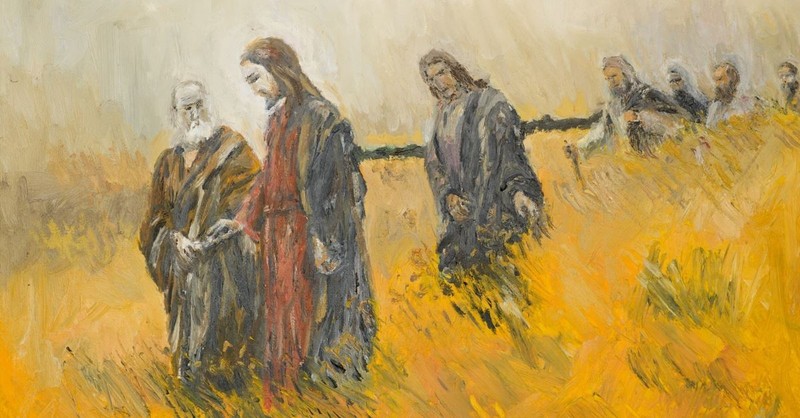
Jesus knows the language of our hearts and the limits of our minds. He knows our desires, fears, and what we truly need. He also knew how to take God’s eternal kingdom principles and share them in ways that brought those truths into our earthly realm. He did this by weaving stories that taught a lesson, or parables, into his ministry. The ability of allegorical tales to reach into hearts and the imagination made parables a favorite method of communication for Jesus, but Scripture shows that he had other reasons to speak in parables as well. Here are some of the reasons Jesus spoke in parables.
Photo Credit: GettyImages/Kevin Schreiber

Parables Illustrate Truth
Parables of the sower, the talents, and hidden treasure are cherished by Bible readers, but the parable of the prodigal son is one that has been known to reach lost souls time and time again. John MacArthur says of it that, “The Prodigal Son parable is without dispute one of the finest examples of storytelling ever — with its penetrating appeal to hearers’ emotions and imaginations; its succinct, tightly crafted form; and its powerful and personally engaging message.”
The power of story is something cultures of every age have long acknowledged. Before the written word it was how history and wisdom were passed to the next generation. Storytelling was in itself a pursuit for understanding. We want to make sense of the joy, suffering, and tumult around us. Living brings questions that beg to be answered and stories help us illustrate concepts which seem too abstract to the general population when presented on their own.
Photo Credit: Thinkstock/Digitalskillet

Parables Reveal People's Hearts
Jesus said, “...The knowledge of the secrets of the kingdom of God has been given to you, but to others I speak in parables, so that, ‘though seeing, they may not see; though hearing, they may not understand.’” Luke 8:10 At first it might seem odd that Jesus would choose to communicate in a way that might be confusing to some, but it was an intentional choice. People would hear the words of Christ and then receive or reject them and this puts the listeners’ hearts on display. Jesus does at times explain certain parables to the disciples, but more often does not. The parables are told and then demand a response; neutrality is not an option. The truths are either accepted or rejected.
In Matthew 13:13-15 Jesus responds to the disciples after they ask him why he speaks in parables, and Jesus replies, “This is why I speak to them in parables: ‘Though seeing, they do not see; though hearing, they do not hear or understand. In them is fulfilled the prophecy of Isaiah: ‘”You will be ever hearing but never understanding; you will be ever seeing but never perceiving. For this people’s heart has become calloused; they hardly hear with their ears, and they have closed their eyes. Otherwise they might see with their eyes, hear with their ears, understand with their hearts and turn, and I would heal them.’”
Photo Credit: Unsplash

Parables Fulfill Prophecy
Jesus fulfilled over 300 prophecies pointing to him as the Christ. One of those prophecies, like buried treasure, is hidden in Psalm 78:1-3, “My people, hear my teaching; listen to the words of my mouth. I will open my mouth with a parable; I will utter hidden things, things from of old—things we have heard and known, things our ancestors have told us.”
Surely Jesus fulfilled this. He even said so himself in Matthew 13:35 “So was fulfilled what was spoken through the prophet: “I will open my mouth in parables, I will utter things hidden since the creation of the world.” Not only did Jesus offer his wisdom, but he also is the Ancient of Days who wrote the redemption plan for our souls with every word.
Photo Credit: Unsplash

How to Read Parables
Mark 4:30-34 is an excellent, quick passage to study in order to better understand the role of parables in Jesus’s ministry, and how to read them.
"Again he said, 'What shall we say the kingdom of God is like, or what parable shall we use to describe it? It is like a mustard seed, which is the smallest of all seeds on earth. Yet when planted, it grows and becomes the largest of all garden plants, with such big branches that the birds can perch in its shade.' With many similar parables, Jesus spoke the word to them, as much as they could understand. He did not say anything to them without using a parable. But when he was alone with his own disciples, he explained everything." (Mark 4:30-34)
Photo Credit: Thinkstock

1. Read in Context
Jesus introduces this parable as one that will help hearers to understand the kingdom. It is important to note if and how Jesus introduces or begins a parable because it will show you how to interpret the story laid alongside the truth. In Scripture, we find parables intended to help us know who our neighbor is, encouraging tales to pray and not give up, stories that teach on eschatology (theology of the End Times), and parables directly targeted at certain groups of people. Making sure to observe the context of each anecdote helps us to know who and what is being addressed.
Photo Credit: Getty Images

2. Check Your Interpretation with Scripture
Make sure your interpretation is in line with the whole counsel of Scripture. For example, if I interpreted the mustard seed parable to illustrate that "as Christ sows the seed of the kingdom of God it will grow into the global church, strong and mighty, offering rest to those who seek shelter in it," I can support this by looking at the other gospels that tell the same parable (Matthew and Luke), and looking for other places like Ezekial 17:22-23 and Daniel 4:12 where branches and birds reflect the royal coming Messiah, and the people of God. However, "if I thought the meaning was if I have faith I will have more birds than anyone else," I would have little ground to stand on when it came to biblical accuracy.
Photo Credit: Unsplash/Sarah Noltner

3. Study Alone AND in Community
God is faithful and Scripture is the word of God. 2 Timothy 2:13 encourages us to remember that, “if we are faithless, he remains faithful, for he cannot disown himself.” This is worth keeping in mind as we seek understanding about parables, because if we interpret a parable to mean something other than what Scripture would support, it should be clear to us that we are the ones in the wrong. God remains faithful. We are not all biblical scholars, and biblical scholars miss the mark of perfection as well. This is why it is important for believers to constantly meditate on, pray through, and discuss the word. All Christians are given the Holy Spirit, and each a gift of the Spirit along with it. Some are gifted to understand scripture more readily, but we are all instructed to share our gifts. We cannot do this alone. The spiritual life is not meant to be lived in seclusion, and studying Scripture shouldn’t be either.
Photo Credit: Thinkstock

4. Pray and don’t give up
The final tip for seeking to understand parables is to ask God to show you his meaning and truth. To know the mind of Christ, we must go before God and ask that he would give us ears to hear, eyes to see, and hearts to understand; seeking him even if understanding doesn’t come easily, and not giving up on knowing him more. There is no one more worth knowing than our awesome God who wants to be known. He has told us stories to help us understand his Kingdom. He has left us his Word so we can move wisely in this world, and he does not leave us alone to figure it out. He walks with us every step of the way. He is like the father who runs out to meet us when we approach him with humble hearts.
 Chara Donahue is a co-author of the Bible study 1, 2 & 3 John: Experiencing Transformation and is working on her next book. She enjoys serving as a biblical counselor, speaking to women, and savoring coffee when her four kids are out playing with dad. She holds an MSEd from Corban University, is passionate about seeing people set free through God's truths, and is the founder and editor of Anchored Voices. Get in touch with her on Facebook or Twitter.
Chara Donahue is a co-author of the Bible study 1, 2 & 3 John: Experiencing Transformation and is working on her next book. She enjoys serving as a biblical counselor, speaking to women, and savoring coffee when her four kids are out playing with dad. She holds an MSEd from Corban University, is passionate about seeing people set free through God's truths, and is the founder and editor of Anchored Voices. Get in touch with her on Facebook or Twitter.
Photo Credit: Thinkstock
Originally published Wednesday, 01 May 2019.



